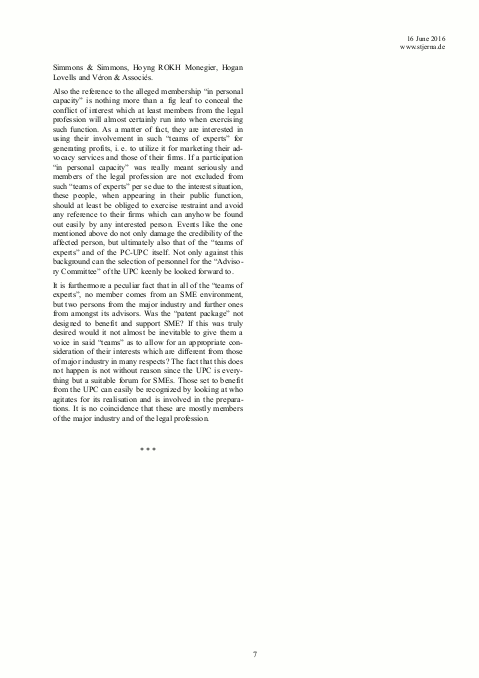

THE UPC is not "unitary", it is not "EU", and it is not "Community" (as it used to be labeled). It is a patent lawyers' wishlist and they are getting close to making this wishlist European law and practice. This is extremely dangerous and it's rather clear who this is going to serve. Battistelli's EPO, which is in the pockets of large corporations, obviously supports the UPC. Battistelli himself has supported the UPC (in previous incarnations thereof) for well over half a decade. He travels to the UK amid referendum to promote his agenda. This ENA graduate knows the drill and it's certainly not serving the public (as those sufficiently familiar with ENA politicians probably know all too well by now).
"Battistelli himself has supported the UPC (in previous incarnations thereof) for well over half a decade."Here in the UK we have what can be viewed somewhat like "moles", or people whose role in the British economy is rather parasitic. They want more for themselves at the expense of those who produce things, such as software. They want software patents and they want the UPC. As we noted here before, Bristows are some of the biggest UPC propagandists out there (also for software patents) and Brian Cordery who is affiliated with Bristows now says that the "reshaping of UK patent litigation by the Judges coincided with the decision by many multinational companies in all sectors to coordinate their European patent litigation more and more – to devise, stress-test and implement strategies in key cases. Many UK law firms were chosen to assist their clients in this process which enabled these firms to gain a wider perspective and provide more joined-up advice to their clients."
How revealing. He then admits that there is a "microcosm of patent litigation" in the mix. To quote: "It seems to the author that in the microcosm of patent litigation, sharing views and learning from each other has led to improved practices across the continent. Now we are of course on the brink of the most exciting development in European patent litigation for nearly half a century. The Unified Patent Court represents an enormous challenge – and an enormous opportunity – to all UK patent litigators. If the UK votes to leave the EU next week, the future of the UPC is uncertain although the future of the UK’s part in the UPC will be clear enough. What would this mean for UK patent litigation? Maybe not so much in the short to medium term – it is not unreasonable to suppose that the English Patents Court might become akin to its counterparts in Canada or Australia – still a venue for patent cases of high value and/or strategic importance. But how much more exciting would it be to shape the UPC which surely has the potential to become the world’s most attractive forum for patent litigation by the end of the next decade?"
"The problem is, the people who engineered the UPC, as the above admits, are people who stand to profit from it."So UPC "has the potential to become the world’s most attractive forum for patent litigation," right? Don't we all love litigation as much as patent lawyers do?
The problem is, the people who engineered the UPC, as the above admits, are people who stand to profit from it. Members of the general public were excluded, as noted here many times before, and Dr. Ingve Björn Stjerna, a longtime opponent of the UPC and its predecessors, has a new paper about it, having just published a whole book on the subject. We have already written a great deal about the UPC being all about rigged panels (excluding particular points of view), which effectively makes it a coup in broad daylight. In the words of Ingve Björn Stjerna: "There have probably rarely been legislative proceedings of such technocratic nature as those on the European “patent package”. Patent practitioners, especially judges and members of the legal profession, have been involved extensively in order to use their experience for the new system. An important role in this is played by the Preparatory Committee of the Unified Patent Court which is entitled to appoint so-called “expert teams” for its support and advice. Conflicts of interest do not seem to play a role when it comes to filling the positions of these teams. Appointments from the legal profession, the members of which often have significant financial interests in the realisation of the “patent package”, have repeatedly been made in favor of the same individuals from only a few law firms. Some of these persons use their membership for promoting the advocacy services of their law firms. These “expert teams” and their composition will afterwards be given a closer look."
Here is the direct link to the PDF in English (there is also one in German). "The “expert teams” of the Preparatory Committee," he explains, is an "[a]rticle on the composition of the “expert teams” of the Preparatory Committee for the Unified Patent Court and on the participation of members from the legal profession “in their personal capacity” (16/06/2016)"
"Perhaps it's time to start a broad, Europe-wide information campaign about the UPC."Well, it sure looks like the UPC might never become a reality at all. Even the EPO quit pretending that this is inevitable. Are politicians even aware of what it is they are ratifying and where it came from? Do they care? Perhaps it's time to start a broad, Europe-wide information campaign about the UPC. We recently heard that FFII might be interested in pursuing this. ⬆